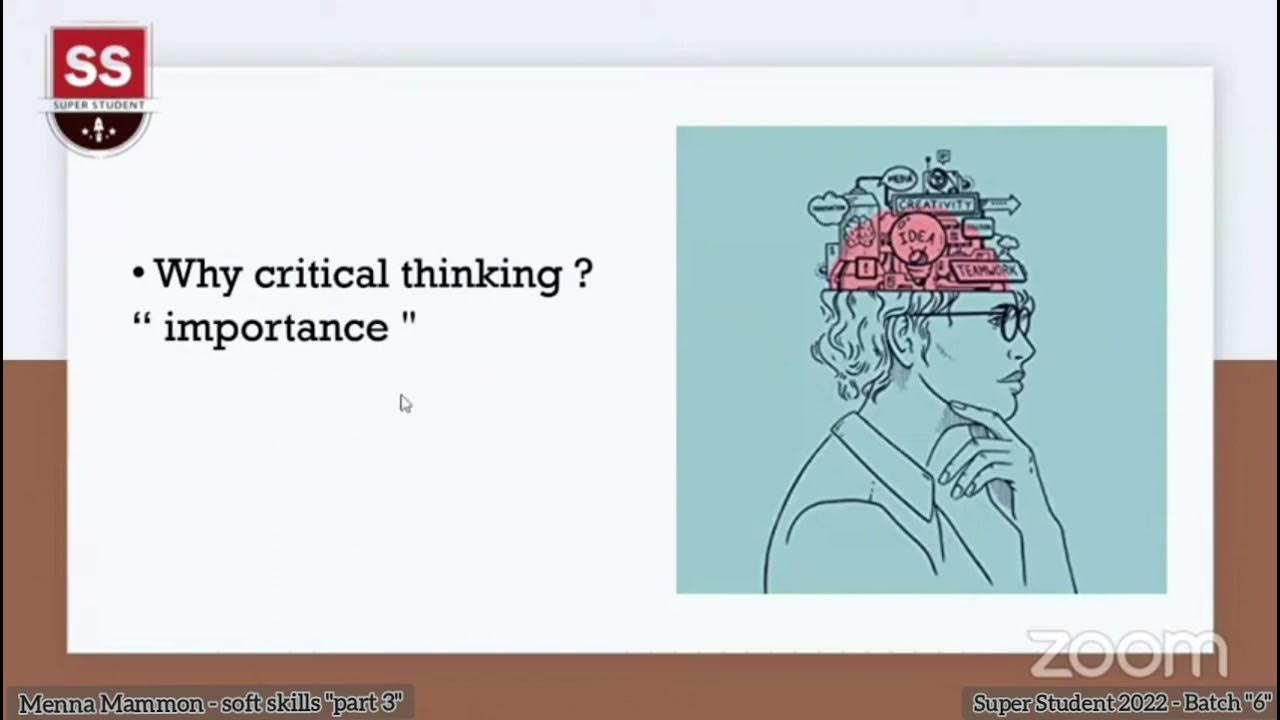Critical Thinking
Summary
TLDRThis video highlights the importance of critical thinking in everyday life and work. Critical thinking involves analyzing, evaluating, and questioning information rather than accepting it at face value. It includes identifying key details, evaluating their relevance and credibility, drawing conclusions, and expressing opinions supported by logical reasoning. To improve critical thinking skills, individuals are encouraged to formulate questions, gather information, consider multiple perspectives, and practice regularly. Developing these skills is essential for making informed decisions and solving problems effectively, especially in professional settings.
Takeaways
- 😀 Critical thinking is the ability to think clearly and rationally about what to do or what to believe.
- 😀 People who think critically do not simply accept information, but filter it first and use knowledge to choose the most important solution.
- 😀 Critical thinking encourages seeking the truth, thinking openly, and being tolerant of new ideas.
- 😀 Critical thinking involves analyzing problems, thinking systematically, and being able to think independently.
- 😀 According to Bloom's taxonomy, critical thinking involves higher-order skills like analyzing, evaluating, and creating.
- 😀 Critical thinking is crucial for work and daily life as it helps in problem-solving and decision-making.
- 😀 To think critically, we must not accept information at face value but instead look for evidence, reasons, and data to support it.
- 😀 Characteristics of a critical thinker include the ability to identify, evaluate, conclude, and express opinions logically.
- 😀 Formulating basic questions is the first step in thinking critically, such as questioning assumptions and seeking to find out more.
- 😀 Gathering information from various sources, like books or the internet, is essential to critically evaluate and analyze ideas.
- 😀 A critical thinker looks at issues from different perspectives, which helps evaluate alternatives and make well-rounded decisions.
Q & A
What is critical thinking?
-Critical thinking is the ability to think clearly and rationally about what to do or believe. It involves questioning, analyzing, and evaluating information before accepting it, and making informed decisions based on evidence.
Why is critical thinking important in daily life and work?
-Critical thinking is essential because it helps individuals make better decisions, solve problems systematically, and assess the validity of information. In the workplace, it allows for improved decision-making and problem-solving, which are crucial in handling complex situations.
What are the key characteristics of a person who thinks critically?
-A critical thinker can identify and organize relevant information, evaluate the credibility of statements, draw well-supported conclusions, and express logical, evidence-based opinions.
How does Bloom's taxonomy relate to critical thinking?
-According to Bloom's taxonomy, critical thinking falls into the category of higher-order thinking skills, which include analyzing, evaluating, and creating. These skills are necessary to engage in deep and thoughtful critical analysis.
What is the role of questioning in critical thinking?
-Questioning is a fundamental part of critical thinking. By asking basic questions such as 'What do I already know?' or 'What am I trying to prove or criticize?', individuals can challenge assumptions, re-evaluate ideas, and build a more accurate understanding of a situation.
How can gathering information improve critical thinking?
-Gathering information, evidence, and data allows individuals to critically evaluate an assumption or idea. By enriching one's knowledge from various sources, a person can form a more comprehensive understanding of a problem and make better-informed decisions.
Why is considering multiple perspectives important for critical thinking?
-Considering different points of view helps to examine alternatives, evaluate options, and make decisions based on a well-rounded analysis. This approach reduces bias and allows for more objective and informed reasoning.
What are some ways to practice and improve critical thinking skills?
-To improve critical thinking, individuals can formulate basic questions, gather relevant information, consider various perspectives, and regularly analyze existing data. Developing these habits strengthens the ability to think critically over time.
How does critical thinking impact problem-solving in the workplace?
-In the workplace, critical thinking enhances the ability to systematically analyze problems, evaluate various solutions, and make sound decisions. This is particularly important when faced with complex situations or when quick, informed decisions are required.
What is the importance of evaluating the credibility of information in critical thinking?
-Evaluating the credibility of information is crucial in critical thinking because it helps to ensure that the information being used is reliable, accurate, and relevant. This process protects individuals from making decisions based on false or misleading data.
Outlines

此内容仅限付费用户访问。 请升级后访问。
立即升级Mindmap

此内容仅限付费用户访问。 请升级后访问。
立即升级Keywords

此内容仅限付费用户访问。 请升级后访问。
立即升级Highlights

此内容仅限付费用户访问。 请升级后访问。
立即升级Transcripts

此内容仅限付费用户访问。 请升级后访问。
立即升级浏览更多相关视频

HAKIKAT FISIKA KELAS 10 -KURIKULUM MERDEKA

Video Pembelajaran Isi Kandungan QS. Ali Imran ayat 190-191 dan Berpikir Kritis Kelas XII SMA

7.3 ازاي استفيد من التفكير النقدي

APAKAH KITA MASIH PERLU PERCAYA ULAMA? I Logika Kumaila @forbidden.questions

TƯ DUY PHẢN BIỆN (CRITICAL THINKING) 🧠 | Định nghĩa & 3 cách đặt câu hỏi phản biện

Kamu Gagal Berpikir Jernih? Ini Logika yang Sering Menipu Kita
5.0 / 5 (0 votes)
